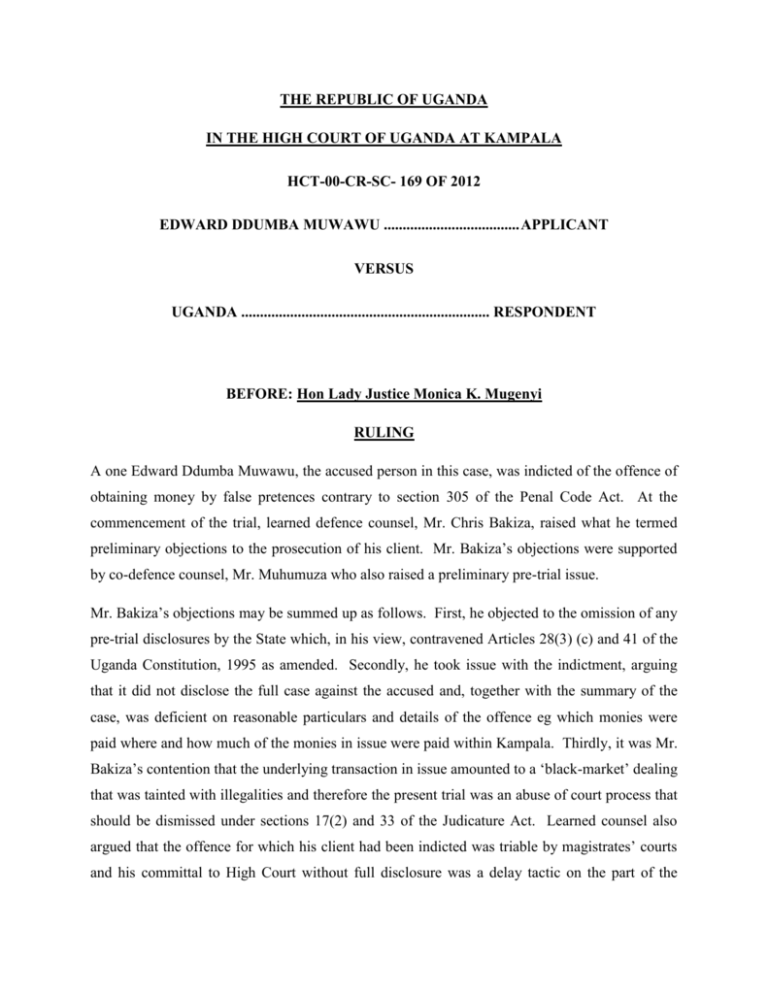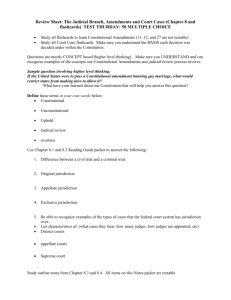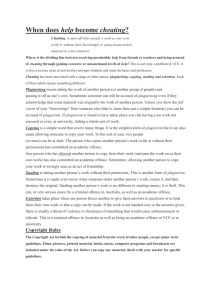hc-criminal-division-2013-12
advertisement

THE REPUBLIC OF UGANDA IN THE HIGH COURT OF UGANDA AT KAMPALA HCT-00-CR-SC- 169 OF 2012 EDWARD DDUMBA MUWAWU .................................... APPLICANT VERSUS UGANDA .................................................................. RESPONDENT BEFORE: Hon Lady Justice Monica K. Mugenyi RULING A one Edward Ddumba Muwawu, the accused person in this case, was indicted of the offence of obtaining money by false pretences contrary to section 305 of the Penal Code Act. At the commencement of the trial, learned defence counsel, Mr. Chris Bakiza, raised what he termed preliminary objections to the prosecution of his client. Mr. Bakiza’s objections were supported by co-defence counsel, Mr. Muhumuza who also raised a preliminary pre-trial issue. Mr. Bakiza’s objections may be summed up as follows. First, he objected to the omission of any pre-trial disclosures by the State which, in his view, contravened Articles 28(3) (c) and 41 of the Uganda Constitution, 1995 as amended. Secondly, he took issue with the indictment, arguing that it did not disclose the full case against the accused and, together with the summary of the case, was deficient on reasonable particulars and details of the offence eg which monies were paid where and how much of the monies in issue were paid within Kampala. Thirdly, it was Mr. Bakiza’s contention that the underlying transaction in issue amounted to a ‘black-market’ dealing that was tainted with illegalities and therefore the present trial was an abuse of court process that should be dismissed under sections 17(2) and 33 of the Judicature Act. Learned counsel also argued that the offence for which his client had been indicted was triable by magistrates’ courts and his committal to High Court without full disclosure was a delay tactic on the part of the prosecution. Finally, Mr. Bakiza argued that the purportedly defective indictment was incurable under section 50 of the Trial on Indictment Act (TIA). On his part, Mr. Muhumuza associated himself with his co-defence counsel’s submission, and stated that given that all the transactions in issue were committed outside Uganda he had filed a constitutional petition to determine whether or not this court had jurisdiction to hear this case. Learned counsel prayed that this trial be stayed pending the determination of the constitutional petition. On the other hand, Ms. Khisa for the prosecution gave a brief history of the present trial intimating that it was the defence that sought to delay the present trial by filing a constitutional petition on the question of jurisdiction that, in her view, was a question that this court was competent to entertain. It was learned counsel’s contention that the indictment was not defective and its accompanying summary of the case was, on the contrary, very detailed. Ms. Khisa argued that by its very definition the summary of evidence did not have to contain the details of the evidence that the prosecution intended to rely on, but rather a summary thereof. She further argued that from the submissions of defence counsel it was quite clear that the accused person did in fact understand the evidence the prosecution intended to adduce. Finally, learned state counsel contended that the transaction(s) in issue were not tainted with any illegality and the prosecution had evidence to that effect. I shall state from the onset that I do agree with Mr. Bakiza on the question of pre-trial disclosure. Learned counsel did not indicate what documents he had sought from the prosecution but this court does agree with the principle of full pre-trial disclosure so as to avert the undesirable practice of prosecution by ambush. However, non-adherence to this principle by the prosecution would not warrant a dismissal of the proceedings but rather an order for due compliance and a time framework within which such compliance may be enforced. In my judgment, the practice of pre-trial disclosure is a distinct and separate issue from statutory requirements that pertain to contents of indictments or charges. Section 22 of the TIA provides as follows on indictments: “Every indictment shall contain, and shall be sufficient if it contains, a statement of the specific offence or offences with which the accused person is charged, together with such particulars as may be necessary for giving reasonable information as to the nature of the offence charged.” In determining the acceptability of an indictment emphasis is also laid on whether or not the particulars therein disclose the commission of an offence recognised by the law. See Ayume, F. J, ‘Criminal Procedure and Law in Uganda’, Law Africa Publishing (U) Ltd, 2010, pp.69, 70. Indeed in Makindia vs. Republic (1966) EA 425, where the particulars of offence in a charge of obtaining money by false pretences did not state that an accused person had obtained the money with intent to defraud, the East African Court of Appeal held that the charge did not disclose any offence at law and such defect was incurably fatal. While there is no mention of a ‘summary of the case’ document in the TIA, section 168 of the Magistrates Courts Act (MCA) makes provision for it in cases to be tried by the High Court. Section 168(2) provides as follows: “The summary of the case ... shall contain such particulars as are necessary to give the accused person reasonable information as to the nature of the offence with which he or she is charged.” In Odoki B.J, ‘A guide to Criminal Procedure in Uganda’, LDC Publishers, 2006 (3rd Edition) p.62 the essence and genesis of a summary of the case as we know it today is summed up as follows: “This is a document that accompanies the indictment and contains information relevant to particulars of the offence. It is merely an outline and replaces the old summary of evidence which was a detailed lay out of the evidence of all the prosecution witnesses as per their police statements as well as details of exhibits.” I have carefully looked at the indictment in the present case. For ease of reference I reproduce it below. “Statement of Offence Obtaining money by false pretences contrary to section 305 of the Penal Code Act. Particulars of Offence Muwawu Dumba Edward and others still at large between December 2010 and December 2011 within the Kampala District with intent to defraud obtained cash Ushs. 360,000,000 and 560,000 Euros (approx. Ushs. 1.68 billion) from LEATY BYESENJE SSEBOWA and CARSTINE JESPERSTEN by falsely pretending that he was selling them gold and transporting it to Europe whereas not.” It does contain a statement of offence and particulars thereof. In my judgment, the particulars of offence are quite clear on the nature of the offence the accused was indicted for. And most certainly, they do explicitly state the accused’s intent to defraud thus including the requisite information on the nature of the offence. I therefore find that the present indictment is not defective, let alone incurably so. With regard to the summary of the case, all that section 168(2) of the MCA enjoins the prosecution to outline therein is such information as is necessary to inform the accused as to the nature of the offence. I would agree with learned state counsel that by its very definition this document is simply a summation of the case, the details of which would then be produced by way of evidence. In the present case, the summary of evidence was quite detailed and did enumerate information that would reasonably inform the accused of the nature of the offence he is indicted for. It need not be as detailed as it appears to have been in the past. See Odoki B.J, ‘A guide to Criminal Procedure in Uganda’ (supra). Indeed the summary of evidence did clearly outline issues of jurisdiction and the legality of the underlying transaction(s) that learned defence counsel were concerned about. In any event, in my judgment, both those issues would be a question of evidence. That evidence should be adduced by witnesses through a trial and not from the bar by way of objections. This court, therefore finds that the summary of the case in the present case was not deficient on material particulars as alleged. Finally, learned defence counsel argued that his client’s indictment and committal to the High Court in respect of an offence triable by magistrates’ courts, and without full disclosure was a delay tactic on the part of the prosecution. With respect to counsel, section 169 of the MCA does mandate the DPP to refer a case for trial before the High Court even if magistrates’ courts have jurisdiction over the same. This court does not find any reason to uphold Mr. Bakiza’s claims of delay tactics. In the result, learned defence counsel’s objections stand over-ruled. I now revert to Mr. Muhumuza’s prayer for a stay of the present trial pending the determination of a constitutional petition arising therefrom. This court has had occasion to peruse the petition in question. It is premised on the provisions of Articles 23 and 137(3) of the Constitution, and seeks the following remedies. 1. A declaration that the present accused person’s arrest, committal and trial are inconsistent with and in contravention of Article 23 of the Constitution. 2. Orders for the accused’s release, quashing of his indictment and trial, as well as compensation for the deprivation of his constitutional right to personal liberty. In a nutshell the petition seeks the interpretation of the Constitutional Court as to whether or not this court has jurisdiction to entertain the present criminal proceedings without unconstitutionally infringing upon the accused’s right to personal liberty. The territorial jurisdiction of the courts of judicature in criminal cases is prescribed in sections 4 and 5 of the Penal Code Act. Section 4(1) limits courts’ jurisdiction to ‘every place within Uganda.’ Section 5, on the other hand, extends the courts’ territorial jurisdiction to include offences partially committed within Uganda. The section reads: “When an act which, if wholly done within the jurisdiction of the court, would be an offence against this Code is done partly within and partly beyond jurisdiction, every person who within the jurisdiction does or makes any part of such act may be tried and punished under this Code in the same manner as if such act had been wholly within jurisdiction.” Conversely, the jurisdiction of the Constitutional Court is detailed in Article 137(1) and (3) of the Constitution. Both legal provisions denote reference to the Constitutional Court of questions that require constitutional interpretation. Further, in the case of James Rwanyarare & Another vs Attorney General Constitutional Petition No. 5 of 1999 Berko JA, citing an earlier decision of the Supreme Court in Ismael Serugo vs. KCC & Attorney General Constitutional Petition No. 2 of 1998, held: “For the Constitutional Court to have jurisdiction the petition must show on the face of it that interpretation of a provisi0n of the Constitution is required. It is not enough to allege merely that a constitutional provision has been violated.” I most respectfully agree with the reasoning in that decision. Indeed, Article 137(5) of the Constitution that provides for stay of other legal proceedings makes such stay of proceedings incidental to the existence of a question of interpretation of the Constitution. For ease of reference the provision reads: “Where any question as to the interpretation of this Constitution arises in any proceedings in a court of law other than a field court martial, the court – (a) ... (b) shall, if any party to the proceedings requests it to do so, refer the question to the Constitutional Court for decision in accordance with clause (1) of this Article.” In my judgment, such reference to the Constitutional Court would not be automatic upon the question of interpretation being raised by a party, as is the case presently. The court from which such reference is sought ought to determine whether indeed there is a question for constitutional interpretation prior to so referring the question. In the present application for reference, it was argued by Mr. Muhumuza that his client wished to have the constitutional court determine the question as to whether the High Court has jurisdiction to try the accused. I take the view that the circumstances of this case are that the question of jurisdiction is a question of evidence and not constitutional interpretation. Upon receipt of such evidence this court is quite competent to determine whether or not it has jurisdiction over the present trial. Article 23 of the constitution pertains to the protection of personal liberty and does not require interpretation. Clearly, if this court determines that it lacks jurisdiction to hear the accused’s trial, it is compelled to release him and thus avert any infringement on his personal liberty. However, clauses (c) and (h) of the same Article 23 do explicitly recognise the legality of curtailing a person’s right to liberty in case of reasonable suspicion of having committed an offence or for any other legally justified purpose. In the result, this court does not find any question on the face of the petition in issue presently that would warrant a reference to the Constitutional Court for constitutional interpretation. This application fails. I do, nonetheless, order State counsel to furnish defence counsel with such disclosure of the case against the accused person as would expedite the ends of justice. I so order. Monica K. Mugenyi Judge 28. 03. 2013





